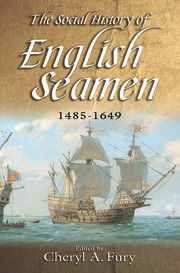Book contents
- Frontmatter
- Contents
- Illustrations
- Contributors
- List of Abbreviations
- Introduction
- 1 The English Maritime Community, 1500–1650
- 2 The Work of G.V. Scammell
- 3 The Men of the Mary Rose
- 4 Tudor Merchant Seafarers in the Early Guinea Trade
- 5 The Elizabethan Maritime Community
- 6 The Religious Shipboard Culture of Sixteenth and Seventeenth-Century English Sailors
- 7 Health and Health Care at Sea
- 8 The Relief of English Disabled Ex-Sailors, c. 1590–1680
- 9 Seamen's Wives and Widows
- 10 Jacobean Piracy: English Maritime Depredation in Transition, 1603–1625
- Conclusion
- Bibliography
- Index
4 - Tudor Merchant Seafarers in the Early Guinea Trade
Published online by Cambridge University Press: 05 September 2013
- Frontmatter
- Contents
- Illustrations
- Contributors
- List of Abbreviations
- Introduction
- 1 The English Maritime Community, 1500–1650
- 2 The Work of G.V. Scammell
- 3 The Men of the Mary Rose
- 4 Tudor Merchant Seafarers in the Early Guinea Trade
- 5 The Elizabethan Maritime Community
- 6 The Religious Shipboard Culture of Sixteenth and Seventeenth-Century English Sailors
- 7 Health and Health Care at Sea
- 8 The Relief of English Disabled Ex-Sailors, c. 1590–1680
- 9 Seamen's Wives and Widows
- 10 Jacobean Piracy: English Maritime Depredation in Transition, 1603–1625
- Conclusion
- Bibliography
- Index
Summary
A socio-economic study of the sailors and seafaring traders active in England's early commerce with equatorial West Africa possesses many advantages. Excep-tionally little is known for the participants within early British maritime expan-sion below the level of commanders. Too often the deep-sea sailor of Tudor and early Stuart England is simply ‘the other’, known to us through the words of their superiors, at sea and on land. He was often portrayed as impulsive, irra-tional, imprudent and mysterious. He was childlike, or brutish, depending upon the context and the objectives of the commentator. Historians of early modern England are well versed in such cultural tropes, and appreciate their value within early modern society, economy and judicial system. To explore the life experi-ences of these young men, for one innovative field of commerce over the initial period of its creation, serves as a constructive counterpoint, at the dawn of the deep-sea English merchant marine. This study highlights individual experience, because a collective appraisal of the individuals who comprised the ‘maritime community’ at sea is the most significant gap in the scholarly literature. As will be seen, this examination exploits the products of death, and there was abundant mortality at sea in the first decade of the Guinea trade.
- Type
- Chapter
- Information
- The Social History of English Seamen, 1485-1649 , pp. 75 - 116Publisher: Boydell & BrewerPrint publication year: 2012

